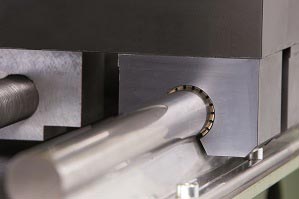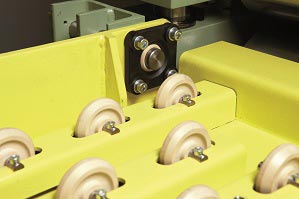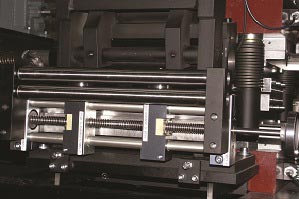Minus eighty degree cold metal sheets
Maintenance-free plastic plain bearings for straightening technologyQuick, straight, precise: this is how the requirements in sheet metal machining can be summarized. Sophisticated straightening technology makes all this possible. Tribo-optimized plastic plain bearings help to optimize machinery and equipment technically and economically. They score points due to their freedom from maintenance and dirt-resistance even in extremely harsh surroundings.
“Whether it is pre-punched round blanks in millimeter thickness, lamellae for clutch construction or cut parts up to 50mm thick – we serve all markets with reliable machines. They satisfy the highest demands and deliver extremely precise results,” says Helmut Kunz, Materials Management Manager and authorized officer at Kohler Maschinenbau GmbH in Friesenheim. “Since the company was founded in 1963, we have developed into an important manufacturer of straightening machines and equipment for the sheet metalworking industry.” Around 130 employees today generate a turnover of around 25 million Euro a year.
With the construction of the first straightening machine for punched components in 1966, the product range was continually expanded. The development and construction of large straightening machines and plant technology for the steel and automotive industry were added in the 80s. Equipment was also produced for making long components and transfer lines, which help to transport the parts inside the press. “With over 5,000 straightening machines built worldwide, we have enormous experience in the fields of straightening technology and coil handling,” says Helmut Kunz.

From the start to the end of the conveyor, 1,400 lubricant-free “iglidur®” rollers from igus® GmbH, Cologne, are used as smooth-running transport rollers. The conveyor is partly coated and oiled.
Different trends in sheet metal working ensure that straightening technology gains increasingly in importance. On the one hand this involves narrower tolerances in production, as increasing flatness requirements are placed on the straightening machine manufacturers by the fabricators. On the other hand, the growing use of high strength steels requires exactly configured machines. Another aspect is the worsening quality of the raw material.
“Due to these factors, the demands on machine technology are steadily growing,” reports the Special Plant Product Manager, Günter Keller. “Our focus is also on the cost aspect, of course without making cuts in the quality. ” That affects both standard machinery, which is increasingly put together in modular systems, and special-purpose machine manufacturing. “In day-to-day business we need more freedom so that we can concentrate better on our strength, special-purpose machine manufacturing,” Günter Keller sums up. “We must always achieve a healthy commercial mix between standard and special-purpose machine manufacturing. “

Maintenance-free “DryLin® R” linear plain bearings with supported shafts as a guide system. The dimensions are compatible with standard ball bearings.
The investment in a straightening machine for processing sheet metal has to pay off in the long term. With their help, nearly all stresses emerging in the sheet metal during forming or punching can be eliminated, so that the quality of the products is right for further processing. Tribo-optimized plastic plain bearings help to solve the various technical challenges here. For many years, machine elements from igus® GmbH, Cologne, have been used in the product range of Kohler Maschinenbau. Above all these involve “iglidur® G” polymer plain bearings, “igubal®” pillow block bearings, “DryLin®” linear guides and “iglidur®” rollers for the band feed. Furthermore, “DryLin® SHT” spindle-lift tables are used. To supply the highly complex machinery and equipment with power, the company uses plastic energy chains. igus® supplies around 80,000 products from stock from batch size one or as piece goods. “From plain bearings for linear technology to plastic rollers – we are always finding more ways to use the lubricant-free and corrosion-resistant components," reports Günter Keller.
“With our machines, above all it comes down to ultimate reliability,” says design engineer Lothar Hug. “When the equipment is in place at the customer, it must runs continuously without problems. ” Three and four shift operations seven days a week are the norm here. The environmental conditions faced by the plastic components are naturally quite different. “On a current project from the aerospace industry, we straighten metal sheets at -80 °C. The result is that we get a lot of condensation on the machine. Another example involves special alloys, which can only be straightened once they cool off to 900 °C,” says the design engineer.
Added to this is a wide variety of climate conditions. At ambient temperatures of 40 to 45 °C and a humidity of 95 percent, the machines must run just as reliably as at -20 °C. However, cinders and the omnipresent rolling and drawing oil pose the biggest demands on the machine elements. “The igus® polymer bearings prove effective even under these harsh environmental conditions,” reports Günter Keller from his daily routine. “Their long operating times, their maintenance-friendliness and resistance to dirt have paid off from the very beginning. “
Design engineer, Lothar Hug, can only confirm this too: “Because our equipment is sometimes found in the tightest of spaces, maintenance and repairs play an increasingly important role for our customers, particularly from the automotive industry. As the polymer bearings are lubricant-free and moreover resistant to dirt, service intervals are reduced to an absolute minimum. Naturally this helps us to score points with our customers!”
A machine with a length of only 13.50m was recently designed for an automotive manufacturer. As it is located in a very tight space, its ease of maintenance was one of the key customer requirements, which was achieved by using plastic plain bearings.

“igubal®” flange bearings with fastening holes, wear-proof and resistant “iglidur®” rollers for belt feed (front).
“Contamination on the lateral guide is often a hot topic for us,” says Günter Keller. Oil drips everywhere, the belt is partly damp. In this aggressive environment, eight “DryLin® R” linear plain bearings with supported shafts act as a guide system, for example. They are based on extremely wear-resistant polymers specially developed for the linear technology. The dimensions are compatible with standard ball bearings. Their special geometry guarantees ruggedness even in extreme environments. On top of this are the high stresses. “Here we also ask our suppliers for a great deal of flexibility.
The effort spent on designing the lateral guide is particularly high. Added to this is the high level of manufacturing depth. “We are intensifying our work with igus® on standard machines. We have the lateral guide supplied as a complete system, which is then just flange-mounted. This means that we no longer have to worry about the time spent on design, parts production and assembly. The technical and economic benefits are around 50 percent,” Lothar Hug reckons. “That is worth it for us in every respect. “

“DryLin® R” linear guide, fitted in lateral guide. The environment is particularly aggressive with dirt and dripping oil.
From the start to the end of the belt, there are a series of processing steps. Around 1,400 “iglidur®” rollers are used for the complete guide system as smooth-running transport rollers. This has several technical benefits. “The conveyor is partly coated and oiled. As the special plastic is resistant, it does not suffer from wear or damage from scratches or other penalties. The surfaces are in perfect condition,” reports Günter Keller.
“iglidur® G” plain bearings and “igubal®” pillow block bearings are also used in the straightening machine for various adjustment functions. They also prove themselves in their respective tasks and ensure safety and high functionality.
There are still a number of ways of using polymer bearings in the straightening machines. For example, the coil is placed onto the reel with an insertion aid as the first step. “There are very high stresses here, which place enormous demands on the technology,” reports Lothar Hug. “Our ready-to-install slewing ring bearings up to 15 tonnes can be used in these places, for example,” says Dominik Hartmann, Technical Sales Advisor at igus®. They are robust and withstand the high strains without any problem.” Initial discussions are already being held. For “especially in special-purpose machine manufacturing, we rely on the expertise of our suppliers, in order to present our customers with the best solution,” Günter Keller is aware.

Long operating times, high stresses: “iglidur® G” plain bearings from igus®. Over 650 sizes available from stock.